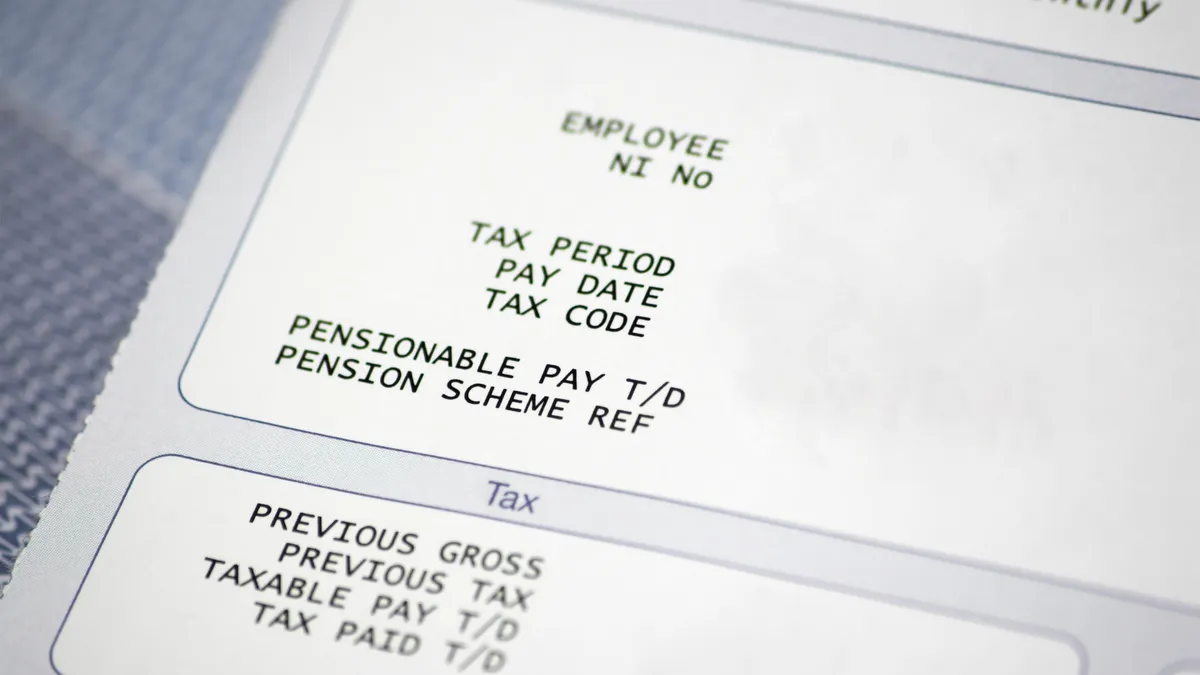Jody Dietel jokes that she doesn't make the best party guest. "People ask what I do, and I get excited, and then they need another drink," she said with a laugh. Dietel's small talk is dominated by what she describes as a lifetime love for consumer directed healthcare policy — not your average party chatter.
Dietel has worked in the benefits space for more than four decades, but the years haven't worn on her passion. She speaks on the topic with the fervor of a sports fanatic reliving last night's game. And while strangers at parties may excuse themselves for another cocktail after hearing her take on tax-advantaged health accounts, her benefits prowess has won her friends, too.
"It's a really important thing," she told HR Dive in a recent interview by video. "I could start a side hustle helping people make their health insurance elections."
Her passion charted the course of her career, which began at Prudential and led to her current role as senior vice president of advocacy and government affairs at HealthEquity.
Of course, healthcare policy isn't Dietel's only interest. She reads voraciously. She dotes on a friend's gaggle of grandchildren. And she spends a lot of time singing and serving in her church choir.
As she reflected on her career, she mused about the importance of the work in her field. The pandemic era emphasizes the crucial role of benefits are in the totality of compensation. Even as Dietel considers the next chapter of her working life, she knows she's not done preaching the power of benefits.
An accidental beginning
Dietel's introduction to consumer-directed healthcare happened by accident. She attended Bethel University in her home state of Minnesota and hoped to work as a music educator after graduation. "But I got vocal nodules," Dietel said. "And the Mayo Clinic told me to pick something else." She toyed with the idea of serving as a missionary but decided she'd rather support missions than be one herself.
Dietel graduated from Bethel in 1979 with a degree in psychology. That August, Dietel landed a job at Prudential, where her father and siblings also worked. "It was the family business," she said.
She intended her time at Prudential to serve as a transition between Bethel and grad school, but it instead introduced her to the niche that would define her career. She started to work on the early versions of flex plans, which allowed employees to pick and choose benefits that fit their needs.
In 1984, Dietel joined the Wyatt Company — what is now Willis Towers Watson. She worked there for three years designing cafeteria flex plans. Her next move came when former Wyatt staffers invited her to join their small consulting firm in 1987. When she flew to San Diego for the job interview, Minnesota was iced over with a windchill of 54 degrees below zero. Her plane landed in 74 degree sunshine, and her new bosses drove her from the airport to a yacht.
"It wasn't really a hard sell to get me to move," Deitel said, laughing. She's been in California ever since.
At her new job in California, Dietel began working with an early version of consumer-directed benefits. "It was the idea that people get their total compensation, and they might as well direct it to the forms they need," she said. "That was the precursor to what we know today as our benefits choices. And it morphed into consumer-directed benefits."
A new start
Dietel left the consulting firm in 1989 to work with smaller employers. She started her own business, which she named Creative Benefits, Inc. Looking back on the start of the business, Dietel laughed at her confidence.
"I was so naive. I had business cards printed over the weekend and came in on Monday and told the group to let me go," she said. Starting out, she had just one client. The client asked her to do its benefits administration, and she agreed, even though she didn't really want to do that kind of work, she said. But then a bank asked her to take on a similar job, and another client after that.
"Before I knew it, I had 95 employees and a really good business," Dietel said.
But she questioned her role in the company's success. She read "Mastering the Rockefeller Habits" (Harnish, 2002), which encouraged business people to examine how their skills aligned with their roles. As she considered whether she wanted to lead a company, Dietel realized she wanted to spend her time thinking about policy and designing solutions.
"And that led me to decide to sell," Dietel said.
In 2008, Dietel received two offers from companies looking to purchase her business. "The money was identical. The only thing that was different was my role," Dietel said. "One had me sailing off into the sunset, and the other wanted me as an executive."
She chose the sunset. But a few days later, her dad passed away, and Dietel changed her mind. She joined WageWorks and served as its chief compliance officer for 10 years.
A visionary role
HealthEquity hired Dietel in 2019, taking on the role of senior vice president of advocacy and government affairs. At this point in her career, Dietel has worked in the benefits world for more than four decades.
"Over the last years, I think I've grown a lot as an individual and as a professional. I think I've found a way to work from my giftedness and abilities and strengths," Dietel said.
HealthEquity bills itself as the leading provider for consumer-directed benefits. "We're the largest HSA provider," Dietel said. "We're the largest FSA, HSA, commuter and COBRA administrator as well. We provide exceptional service. I couldn't be prouder to be here."
At HealthEquity, Dietel focuses on advocacy and government affairs — the job is far more visionary than her previous position at WageWorks, she said. Her role requires her to monitor legislation and regulatory change. The job also positions her to provide industry leadership, and HealthEquity holds board positions at institutions like the American Benefits Council and the U.S. Chamber of Commerce.
Her advocacy focus has led her to push for a number of legislative changes. She's particularly proud of the effort that led to the repeal of the stipulation in the Affordable Care Act which required that consumers get a prescription for over-the-counter drugs they wanted to get reimbursed with an HSA or FSA.
"We spent a lot of time trying to say: this doesn't make sense. It's increasing healthcare costs. People are getting prescriptions but then they need a doctor visit," Dietel said.
Congress made a full repeal of the requirement after the pandemic hit. "Up until recently, there was no treatment for COVID-19 other than over-the-counter drugs and medicines. In an early bid, Congress decided that those would be eligible medical expenses without a prescription again," Dietel said. "That was an issue we worked on for a number of years, and the pandemic gave us an opportunity."
To keep growing in her work, Dietel said she's learned to ask herself whether she has a voice and whether she feels she adds value. "I think I do," she said speculatively. "Time will tell," she said. "That's why I'm still in it, and I'm having a blast. When I think back to the pandemic and some of the changes that we've been instrumental in speaking into, that's pretty cool when you can see something in Congress or the IRS and you know you told them about that."
Hope for a healthier nation
Dietel knows healthcare is an emotional subject. "You have to be a discerning and thinking consumer, and yes, healthcare is emotional," she said.
She thinks back to her heart surgery in early September. "It was during the pandemic, so it was a drop-you-off-at-the-door situation. I tend to be a little bit anxious anyways, but it was a better experience because I didn't have anyone to play off my fears. I did just fine."
"The weird thing was, that little surgery, 24 hours in the hospital, cost $98,000," she said. "What could they have possibly done that was worth that much money?"
Even so, Dietel wouldn't want to argue with her heart surgeon. "I'm glad he did what he did. But it does get you to think about the value," she said. "That's a pretty important piece of my compensation. I didn't have to worry about it. I didn't have to pay for it. And I was in the best hospital in San Diego."
It's experiences like this one that continue to affirm for Dietel the importance of consumer-directed healthcare. "Maybe I'm a nerd," she said with a shrug. "But to the extent that we can educate people in a better way about healthcare, about being healthier, all those things are going to contribute to a healthier nation."
As Dietel thinks about the next phase of her career, she ponders writing a book called "Raise Your Pay" — a guide that can help American workers make their paychecks go farther by gaming their benefits selections.
Whatever she does next, she won't leave consumer-directed benefits behind.
"It may be that I'm 64 and I'm thinking about my next chapter. I'm not going anywhere anytime soon because I'm having a blast," she said, smiling. "I think about my legacy. I've worked hard my whole career. But has it made a difference?"
"When I look at the number of people who have HSAs and FSAs — there are nearly 100 million Americans who have consumer-directed benefits accounts," she said, referencing a report from the Employers Council on Flexible Compensation. "When I look at that, gosh dang it, I've had an impact on the ordinary consumer, on the 100 million people who have gotten to get tax-advantaged help."
Correction: An earlier version of this article incorrectly identified a board on which Dietel sits. She is with the American Benefits Council. HR Dive regrets the error.




















